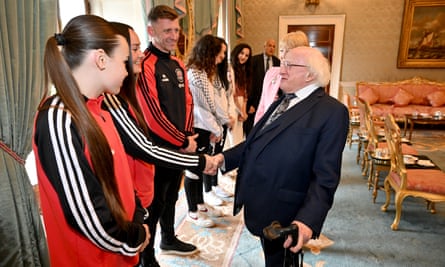“We have a reason to tell the people that we are human beings,” says Mira Natour, a defender for the Palestine women’s national team, as she reflects on their friendly against Bohemians in Dublin on Wednesday night. “We have rights the same as you, to play, we have the right to express our feelings, we have the right to be recognised by the world. With this event, we’re telling them we exist.”
It will be the first time the Palestine team have played in Europe and their League of Ireland hosts have sold out, with a 4,500 crowd expected at Dalymount Park. Bohemians are fan-owned and their membership’s strong allegiance with the Palestinian cause mirrors a sentiment shared by many in Irish football and the country as a whole.
Palestine flags are often seen at Bohemians matches, and in advance of the 2023 season they released a Palestine-themed away jersey. Palestine Sports For Life, which operates in the occupied West Bank and Gaza, was handed 10% of the proceeds from shirt sales, which went towards a project at the Tulkarm refugee camp in the West Bank. The jersey sold well and tentative conversations with the Palestinian Football Association about a friendly began.
The Palestine squad have two representatives from Tulkarm in the match delegation and, once the costs of the trip have been covered, the remaining income from the game will be split between Palestine Sports for Life, Medical Aid for Palestinians and a Bethlehem gym with Irish involvement called Aclaí Palestine. Seán McCabe, one of the organisers, said there had been discussions about playing a return game when it is safe to do so and that he hoped Wednesday’s match would be a catalyst for a men’s friendly between the Republic of Ireland and Palestine.
McCabe says the the global streaming of the match should serve as “an acknowledgement” of what has happened to the Palestinian people. “These people are deserving of the same rights and dignities as everyone else,” he says.
“You should live a life free of fear and free of persecution and you should have the ability to hope to do what it is you want to do. Being a footballer for so many people, for so many girls and boys, is the dream. The fact that sport has been taken away from so many people in the West Bank is sad.”
The Bohemians captain, Rachael Kelly, says it is a “massive occasion” and hopes other League of Ireland clubs will follow suit. The team met the Palestine players at Dublin airport on Sunday. “None of the girls needed convincing when this was announced,” Kelly says. “We were all on board straight away, and we couldn’t wait.”
Both sets of players met Ireland’s president, Michael Higgins, at Áras an Uachtaráin, his official residence, on Monday. Ireland has recently moved closer to recognising the state of Palestine. It played a leading role in advocating for the UN resolution on Palestine’s membership, which passed by an overwhelming majority, with 143 states voting in favour last Friday.

The women’s league in the West Bank was meant to start on 9 October but never got going and Natour was part of an understrength Palestine squad dogged by logistical issues that travelled to Saudi Arabia for the West Asian championships in February. Most of the team juggle jobs while pursuing football careers. Bisan Abuaita, 26, is a project coordinator for an NGO, and Natour, who celebrates her 25th birthday on Wednesday, is a doctor.
Abuaita plays for Orthodoxi Beit Sahour, a team based in a town east of Bethlehem. “We stopped [training] for a week,” she says, describing the standstill after the Hamas attacks on Israel on 7 October and Israel’s response. “We said to our coach that we really wanted to play football because it’s the only source that would help us. It was the only thing that I think got us through it.”
after newsletter promotion
Playing as a right-sided forward or No 10, Abuaita feels that being a Palestinian athlete is “tougher than being an athlete from anywhere else” because there is little chance of making it as professional in another country as “nobody sees you play”. She also alludes to the difficulty of being accepted in other countries with a Palestinian passport.
An increase in the number of West Bank checkpoints and raids since October has brought logistical hassle and danger. Even though clubs in or near Bethlehem, such as the ones Natour and Abuaita play for, have been able to train, the ones further north in the West Bank based in towns such as Nablus have not been able to access their facilities. Natour and Abuaita say they have been training under the watchful eyes of Israeli army vehicles.
Abuaita, who could not get time off work to play in the West Asian championships, is grateful for a chance to represent her country, acknowledging how far things have come since the team were founded in 2003. “I really want to thank Bohemians,” she says. “I think what they’re doing is just amazing, inviting us to come and play in their homeland.”
Asked what clubs can learn from Bohemians, she says she appreciates people’s empathy because it is an humanitarian cause but it was down to clubs and governments to “read and know more about facts”.
“We’re one in the field, and we’re one outside of it as well,” she says.
Source: theguardian.com


